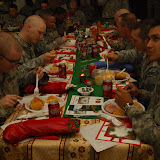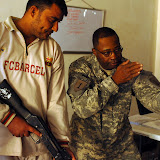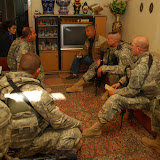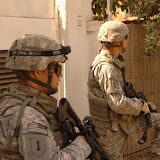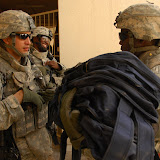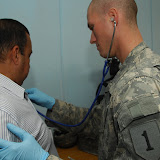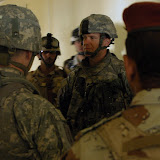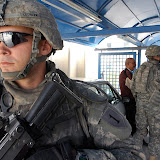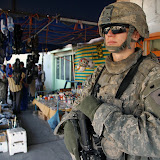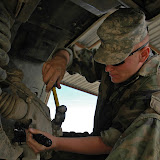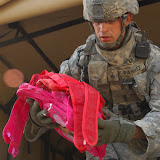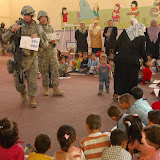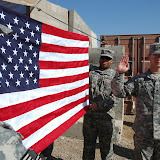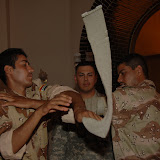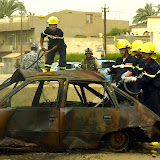Troops Celebrate Christmas With Dinner, Candlelight Service
DVIDSHUB
Photographer: Spc. Charles Gill
Date Taken: December 25th, 2007
Christmas in Yarmuck
- Sgt. Vincent Passero and 2nd Lt. Patrick Henson from Battery B, 2nd Battalion, 32nd Field Artillery, attached to 2nd Brigade Combat Team, 101st Airborne Division (Air Assault) discuss strategies while playing a game of Risk at the battery's Christmas party at Joint Security Station Torch in Yarmouk, Iraq, Dec. 25.
- Soldiers from Battery B, 2nd Battalion, 32nd Field Artillery, attached to 2nd Brigade Combat Team show some holiday sprit and love at the Battery's Christmas party at Joint Security Station Torch in Yarmouk, Iraq, Dec. 25.
- Soldiers from Battery B, 2nd Battalion, 32nd Field Artillery, attached to 2nd Brigade Combat Team, 101st Airborne Division (Air Assault), prepare snacks at the Battery's Christmas party at Joint Security Station Torch in Yarmouk, Iraq, Dec. 25.
- Soldiers from Battery B, 2nd Battalion, 32nd Field Artillery, attached to 2nd Brigade Combat Team, 101st Airborne Division (Air Assault), enjoy a special holiday meal brought out to the Battery's Christmas party at Joint Security Station Torch in Yarmouk, Iraq, Dec. 25.
- Staff Sgt. Valentin Pena, Battery B, 2nd Battalion, 32nd Staff Sgt. Valentin Pena, Battery B, 2nd Battalion, 32nd Field Artillery, attached to 2nd Brigade Combat Team, 101st Airborne Division (Air Assault), serves a special holiday meal brought out to the Battery's Christmas party at Joint Security Station Torch in Yarmouk, Iraq, Dec. 25.
- Soldiers from Battery B, 2nd Battalion, 32nd Field Artillery, attached to 2nd Brigade Combat Team, 101st Airborne Division (Air Assault), take part in a candlelight ceremony at the Battery's Christmas party at Joint Security Station Torch in Yarmouk, Iraq, Dec. 25.
- Chaplain (Capt.) Troy Parson, 2nd Battalion, 32nd Field Artillery, attached to 2nd Brigade Combat Team, 101st Airborne Division (Air Assault), leads Soldiers in a prayer at a candlelight ceremony at the B Battery's Christmas party at Joint Security Station Torch in Yarmouk, Iraq, Dec. 25.

